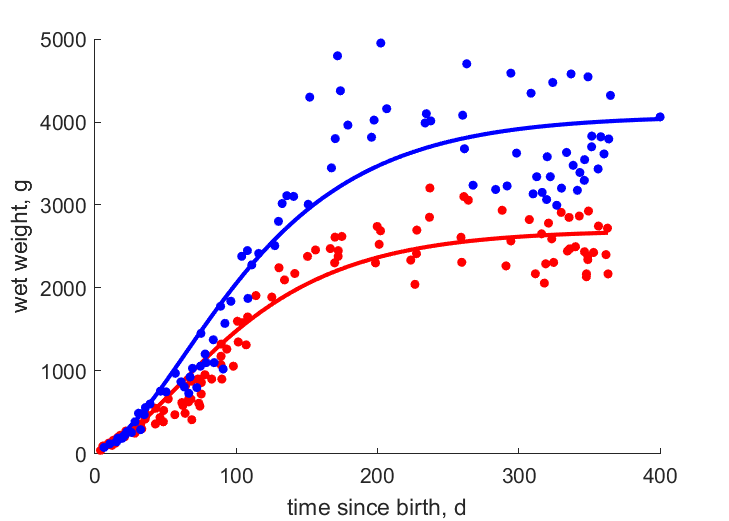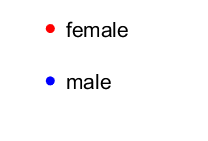Predictions & Data for this entry
| Model: stx | climate: Dfb, Dsb | migrate: | phylum: |
| COMPLETE = 2.5 | ecozone: THn | food: bxM, xiCv, xiCi | class: |
| MRE = 0.066 | habitat: 0iFm, 0iFl, 0iFr | gender: Dg | order: |
| SMSE = 0.014 | embryo: Tv | reprod: O | family: |
Zero-variate data
| Data | Observed | Predicted | (RE) | Unit | Description | Reference |
|---|---|---|---|---|---|---|
| tg | 45 | 44.99 | (0.0002151) | d | gestation time | AnAge |
| tx | 66 | 65.99 | (8.879e-05) | d | time since birth at weaning | AnAge |
| tp | 365 | 359 | (0.01656) | d | time since birth at puberty for females | AnAge |
| tpm | 365 | 373.1 | (0.02228) | d | time since birth at puberty for males | AnAge |
| am | 5220 | 5218 | (0.0002088) | d | life span | AnAge |
| Wwb | 35 | 34.96 | (0.00124) | g | wet weight at birth | AnAge |
| Ri | 0.006849 | 0.006883 | (0.004873) | #/d | maximum reprod rate | AnAge |
Uni- and bivariate data
| Data | Figure | Independent variable | Dependent variable | (RE) | Reference |
|---|---|---|---|---|---|
| tW_f |   | time since birth | wet weight | (0.1365) | FrosKroh2005 |
| tW_m |   | time since birth | wet weight | (0.1558) | FrosKroh2005 |
Pseudo-data at Tref = 20°C
| Data | Generalised animal | Martes pennanti | Unit | Description |
|---|---|---|---|---|
| v | 0.02 | 0.1672 | cm/d | energy conductance |
| kap | 0.8 | 0.9764 | - | allocation fraction to soma |
| kap_R | 0.95 | 0.97 | - | reproduction efficiency |
| p_M | 18 | 145.9 | J/d.cm^3 | vol-spec som maint |
| k_J | 0.002 | 0.002 | 1/d | maturity maint rate coefficient |
| kap_G | 0.8 | 0.8007 | - | growth efficiency |
| t_0 | 0 | 36.26 | d | time at start development |
Discussion
- Males are assumed to differ from females by {p_Am} only
- Body temperature from Neovison
- mod_1: males have equal state variables at b, compared to females
Facts
- The implantation can be delayed and extend the gestation time up to one year. (Ref: AnAge)
Bibliography